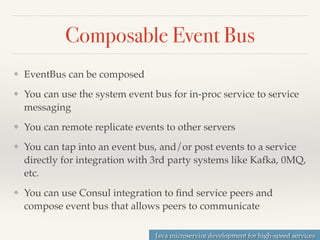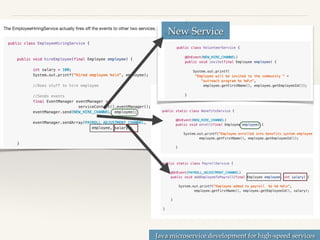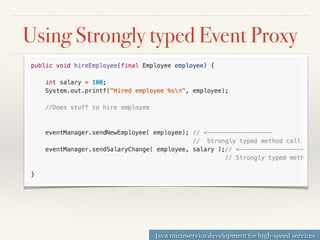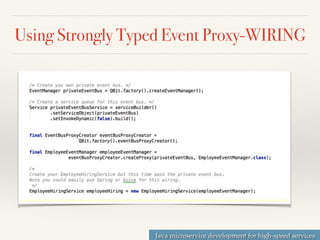Ad
The Java Microservice Library
- 1. Java microservice development for high-speed services Java Microservice lib QBit high-speed, in-memory, services for REST, WebSocket and JSON
- 2. Java microservice development for high-speed services What is QBit? ❖ Fast queue based service engine! ❖ Services sit behind high-speed queues! ❖ Uses micro-batching and mechanical sympathy to create high speed REST and WebSocket microservice! ❖ Programming model looks like Spring MVC, but enables high-speed async model like Akka, Vertx, Reactor, but easier to program! ❖ Uses Consul or Etcd for clustering, health, cloud config, elasticity ! ❖ Has event bus that can use Kafka, 0Q, etc.! ❖ Uses JSON for wire protocol, works easily with any language over HTTP or WebSocket
- 3. Java microservice development for high-speed services Why QBit? ❖ Just a lib, does not take over the world! ❖ Works with Guice or Spring! ❖ Just POJOs written like Java developers write POJOs no steep learning curve! ❖ FAST!! ❖ Easier than reactive, worker pools, sharded services and queued services! ❖ Uses Consul for service discovery, WebSocket for high-speed messaging and REST
- 4. Java microservice development for high-speed services Architects / Developers of QBit ❖ Wrote high throughput global services for large high-traffic clients! ❖ F5 crushing load!! ❖ Implemented systems that took other systems 10x to 100x as many servers and 20x #of developers that could handle only 1/10th of the traffic ! ❖ Wrote JSON parser that is 4x faster than mainstream JSON parsers! ❖ Been there, done that for 20+ years. 100+ years building high-speed, reliable systems combined! ❖ Consulting with airlines, plane manufacturers, banks, commodity trading, electronic manufacturing, and other trading systems! ❖ Wrote services that powers some of the busiest sites on the Internet! ❖ Wrote fastest disk batcher for JVM, high-speed, distributed k/v store, in-memory db
- 5. Java microservice development for high-speed services QBit Speed - FAST! ❖ 200 M in-proc messages a second! ❖ 10M to 100M in-proc events per second! ❖ 700K to 1,000,000 RPC calls! ❖ Equates to 1.4M to 2M messages TPS! ❖ Using JSON! One Service Thread! One WebSocket!! ❖ Not uncommon to use a fraction of CPU for 2x to 10x to 100x the same performance as a traditional microservice
- 6. Java microservice development for high-speed services It all starts with a fast queue
- 7. Java microservice development for high-speed services Speed First
- 8. Java microservice development for high-speed services Service Discovery / Health ❖ Integration with Consul for health and event bus wiring of peers! ❖ Cloud config! ❖ Peer discovery! ❖ Health Checks! ❖ Serf/Dead man’s switch, gossip, custom
- 9. Java microservice development for high-speed services Ease of use and simplicity too
- 10. Java microservice development for high-speed services What is QBit again? ❖ Java microservice development for high-speed services! ❖ JSON! ❖ REST! ❖ WebSocket! ❖ Services look like Spring MVC REST / JAX-RS ! ❖ look like Spring Boot, Drop-wizard but work like Spring reactor, Akka, Go, ErLang, etc. ! ❖ Embraces microservices! ❖ Clients can be Web, Mobile, any language that has JSON lib, HTTP lib can use QBit services
- 11. Java microservice development for high-speed services QBit Services ❖ WebSocket RPC, HTTP REST, and in-proc messaging! ❖ In-proc, sits behind an actor style queue, gets notified of queue empty, queue limit, queue init, queue start batch, etc.! ❖ Allows reduction of sending IO or calls to CPU intensive services in batches based on queue events! ❖ Batching calls increases system throughput through the system 10x, 100x, 1000x.
- 12. Java microservice development for high-speed services Key Concepts ❖ `! ❖ Queue ! ❖ A thread managing a queue. ! ❖ supports batching. ! ❖ queue callbacks for empty, reachedLimit, startedBatch, idle, etc.! ❖ ServiceQueue! ❖ POJO (plain old Java object) behind a queue! ❖ receive method calls and events ! ❖ thread safe! ❖ queue callback methods! ❖ Java idioms looks like Spring MVC REST, JAX-RS! ❖ ServiceBundle ! ❖ Many POJOs behind one response queue and many receive queues. ❖ ServiceServer ! ❖ Exposes services to REST/JSON and WebSocket/JSON communication! ❖ EventBus ! ❖ send a lot of messages to services ! ❖ may be loosely coupled,! ❖ integration with others event buses (Kafka, STOMP, etc.)! ❖ Metrics/Stats: track in-flow, and outflow of messages, other metrics for performance, high-speed time-series database with REST interface! ❖ Meta-Data-Service: Publish track all REST JSON schemas for easy integration and use by third parties
- 13. Java microservice development for high-speed services Principles of QBit ❖ Web first (JSON, HTTP, WebSocket)! ❖ Integration via high-speed event bus (Kafka, STOMP, 0MQ, ActiveMQ, etc.)! ❖ Embrace Mechanical Sympathy and Queue Theory to optimize thread hand-off, IO, and core cross talk! ❖ Less is more (be the 95% solution leave the long tail alone)! ❖ Fun and easy to use!
- 14. Java microservice development for high-speed services QBit Service Example Domain Object Service WebSocket HTTP support
- 15. Java microservice development for high-speed services QBit Example CURL-ABLE JSON Output
- 16. Java microservice development for high-speed services Service REST support ❖ Supports Request params, URI params, JSON POST, HTTP GET, etc.! ❖ Customize URIs using annotation! ❖ Reasonable Defaults (annotations not needed)! ❖ Methods available via annotations
- 17. Java microservice development for high-speed services QBit versus….
- 18. Java microservice development for high-speed services QBit versus Spring XXX ❖ Spring what? DI? MVC? Boot?! ❖ QBit Works easily with DI and Spring Boot! ❖ Competes against Spring MVC but has better thread model for high-speed services, but not all the “features”.! ❖ Spring MVC does a lot. QBit only does Microservices only! So only JSON, REST, and WebSocket! ❖ QBit Enable writing in-memory, high-speed services that can handle 200K TPS to 2M TPS per second single node
- 19. Java microservice development for high-speed services Akka vs. QBit ❖ Akka uses actor model! ❖ QBit uses queuing actor-like model + active objects model! ❖ Akka focuses on Queue handlers! ❖ QBit focuses on Services that look / act like Java services in Spring REST, JAX-RS, Java EE, and other frameworks! ❖ QBit is a Java centric model, Akka programming model is similar but foreign to most Java developers! ❖ QBit center of gravity is Microservices = REST, JSON, WebSocket
- 20. Java microservice development for high-speed services Akka and QBit similarities/differences ❖ Akka Typed Actor a lot like QBit Service! ❖ QBit Services can be exposed via REST/JSON or WebSocket/JSON! ❖ Both use queue events (empty, init, limit, etc.) to optimize output to IO! ❖ Both are fast! ❖ QBit is library and you can use / compose queues, services as you see fit (you could use QBit in a Spring app)
- 21. Java microservice development for high-speed services Node.js, Vertx ❖ Node.js and Vertx both use a Reactor style design pattern based on event bus. (QBit is reactive but using active objects not reactor.)! ❖ At first glance looks a lot like Akka or QBit! ❖ Less granularity on bus, QBit bus speed is a lot faster! ❖ Less control of when queue is idle, empty, etc. QBit has Akka like tuning which is critical to optimize around back pressure.! ❖ Vertx/Node.js are harder to optimize. Harder to compose other handlers. ! ❖ Great for IO and Vertx can be combined with QBit to provide missing pieces for Speed! ❖ Not bad. Not even close to what QBit can do! ❖ QBit works well with Vertx
- 22. Java microservice development for high-speed services How does it do? ❖ Faster! ❖ Easier to use! ❖ Focuses just on Micorservices! ❖ Tolerant reader, promiscuous writers! ❖ Uses RAFT and Consul for service discovery
- 23. Java microservice development for high-speed services Event Bus Overview
- 24. Java microservice development for high-speed services Event Bus ❖ QBit has a high-speed event bus modeled loosely on Vertx style event bus! ❖ Very fast. ! ❖ In-proc but can be integrated with others! ❖ Service methods can be invoked by calls (remote and local behind a queue) ! ❖ Service methods can be invoked by listening to a event bus channels! ❖ You can subscribe to channels or you can consume channels or both
- 25. Java microservice development for high-speed services Composable Event Bus ❖ EventBus can be composed! ❖ You can use the system event bus for in-proc service to service messaging! ❖ You can remote replicate events to other servers! ❖ You can tap into an event bus, and/or post events to a service directly for integration with 3rd party systems like Kafka, 0MQ, etc.! ❖ You can use Consul integration to find service peers and compose event bus that allows peers to communicate
- 26. Java microservice development for high-speed services Event Bus is an Integration point ❖ Event bus is an integration point! ❖ Can be easily integrated with Camel, ActiveMQ, JMS, Kafka, etc.! ❖ Events come in on same queue as method call! ❖ Event Bus can do remote broadcast and can discover peers via Consul or Etcd
- 27. Java microservice development for high-speed services QBit Event Bus
- 28. Java microservice development for high-speed services Private event bus versus System event bus ❖ Private event bus! ❖ https://github.com/advantageous/qbit/wiki/%5BRough-Cut%5D-Working- with-private-event-bus-for-inproc-microservices! ❖ Only your module uses it! ❖ System event bus! ❖ https://github.com/advantageous/qbit/wiki/%5BRough-Cut%5D-Working- with-event-bus-for-QBit-the-microservice-engine! ❖ Used by default if you don’t define your own! ❖ Event buses are composable! ❖ events are intrinsic to Services and event buses can be wired to services and other event buses
- 29. Java microservice development for high-speed services Simple Example Java 8 Lambda Annotation Based Send Consumer Subscriber
- 30. Java microservice development for high-speed services More involved Example ❖ Advantage of using the event bus with QBit services is the events come into same queue that handles method calls so events method calls are thread safe! ❖ Event Bus is very fast. Expect speeds up to 10M to 100M messages a second.! ❖ New example: set of services that handles when a new employees is hired! ❖ Add the employee to payroll system, ! ❖ Enroll employee into benefits system! ❖ Invite employee to our community outreach program! ❖ Four services but the first service will not know about other services
- 31. Java microservice development for high-speed services Channels and Employee
- 32. Java microservice development for high-speed services EmployeeHiringService
- 33. Java microservice development for high-speed services Service that listen
- 34. Java microservice development for high-speed services
- 35. Java microservice development for high-speed services Getting a client proxy to a service
- 36. Java microservice development for high-speed services Services are just POJOs
- 37. Java microservice development for high-speed services Wire in POJOs services
- 38. Java microservice development for high-speed services Create a client proxy from service
- 39. Java microservice development for high-speed services Add a new Service Listener?
- 40. Java microservice development for high-speed services New Service
- 41. Java microservice development for high-speed services Event Manager ❖ You can use a private event bus instead of a system event bus! ❖ You can use strongly typed proxy to the event bus to abstract channel names and provide a strongly typed bus
- 42. Java microservice development for high-speed services Strongly Type Interface
- 43. Java microservice development for high-speed services Using strongly typed interface to event bus
- 44. Java microservice development for high-speed services Using Strongly typed Event Proxy
- 45. Java microservice development for high-speed services Using Strongly Typed Event Proxy-WIRING
- 46. Java microservice development for high-speed services Working with callbacks https://github.com/advantageous/qbit/wiki/%5BRough-Cut%5D-QBit-Microservice-Lib- Working-With-CallBacks
- 47. Java microservice development for high-speed services Callbacks
- 48. Java microservice development for high-speed services Recommendation service callback
- 49. Java microservice development for high-speed services ServiceQueue Proxy for service
- 50. Java microservice development for high-speed services Recommendation service
- 51. Java microservice development for high-speed services Handling a callback
- 52. Java microservice development for high-speed services
- 53. Java microservice development for high-speed services
- 54. Java microservice development for high-speed services Lambdas are great until you can’t read your code anymore Lambda calling Lambda, calling Lambda calling Lambda.! ! Stop using Lambda if your code starts to look like Perl threw up on Lisp.! ! One, to three levels ok.! ! Five or six, can you break this out into a method call or two.
- 55. Java microservice development for high-speed services Don’t forget to flush Auto flushing is available too!
- 56. Java microservice development for high-speed services But gee what if we have to load the user data? ❖ The first rule is don’t block! ❖ Services can call other services! ❖ When a service might do IO then it should take a callback instead of have a return (generally speaking)
- 57. Java microservice development for high-speed services
- 58. Java microservice development for high-speed services Use Callback instead of blocking
- 59. Java microservice development for high-speed services If user is loaded, just call callback
- 60. Java microservice development for high-speed services If you need to load the user, do it async…
- 61. Java microservice development for high-speed services Doing something later…, but not too much later
- 62. Java microservice development for high-speed services Async procrastination a good thing…
- 63. Java microservice development for high-speed services When to handle callbacks? When your queue is empty, ! when you hit your queue limit,! and ! perhaps at the start ! of a new message batch?! ! Handle callbacks before handling new method calls so clients don’t wait around with open connections
- 64. Java microservice development for high-speed services Workers for IO, Sharded Services for CPU ❖ QBit allows worker pools for IO bound workers! ❖ QBit allows sharded for CPU bound workers that work on in-memory data! ❖ Or just regular workers! ❖ Queue system can detect when CPU bound services are busy and auto-increase queue batch size





















































































































































